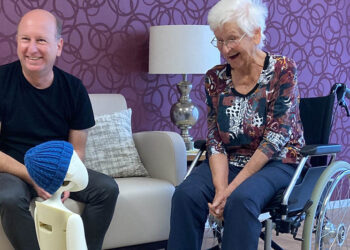Our thematic blocks:
- Why we need to talk about adult representation
- Situation in Austria (with checklist)
- Situation in Germany (with checklist)
- Conclusion: Low-threshold support would avoid legal representations
The question of how to legally represent and support people in crisis or illness situations affects thousands of families every year. It often concerns people who are no longer able to manage their own affairs due to dementia, mental illness or similar impairments.
There are clearly regulated systems for this in both Austria and Germany – but the interviews with Andreas Gschaider, Head of Department at VertretungsNetz Österreich, and Elmar Kreft, Managing Director of the Fachverband Betreuungsgerichtstag e. V. in Germany, show: The challenges are increasing and the systems are reaching their limits in the face of rising case numbers and structural developments.
What is adult representation or legal representation – and why is it so important?
People who are no longer able to manage their own affairs without the risk of significant disadvantage due to mental illness or a comparable impairment of their decision-making capacity are supported. Instead of complete incapacitation – as was common in the past – the aim today is to
The importance of this topic is increasing, particularly in the wake of demographic change: more and more older people are living with chronic illnesses or cognitive impairments, while at the same time there is a lack of family networks and professional structures. The issue is also being driven by eroding structures – particularly in rural areas – and digitalization.
We would like to draw particular attention to this in this article: Those who make provisions at an early stage – for example through a power of attorney – can prevent strangers from making key life decisions in the event of an emergency.
Dealing with adult representation in good time is not only a legal issue, but also a social one: it creates security for those affected, relieves the burden on relatives and the structures in adult representation, which are already reaching their limits. No one is immune – after an accident, anyone can find themselves in a situation where they need legal support.

Our interview partner for the situation in Austria: Andreas Gschaider, Head of Department for Adult Representation at VertretungsNetz Österreich.
About VertretungsNetz: The Austrian Adult Protection Association represents, supports and advises in the areas of adult representation, patient advocacy and resident representation. To the homepage: vertretungsnetz.at
The situation in Austria: Four pillars of adult representation
The Austrian system is based on four pillars: The health care proxy, as well as elected, legal and judicial adult representation. The most ideal form is the health care proxy, in which you decide for yourself in good time, if you are still capable of making decisions, who should represent you in the event of an emergency. “The intention of the law is to avoid adult representation in the sense of the UN Convention on the Rights of Persons with Disabilities (UN CRPD) as far as possible,” explains Andreas Gschaider, Head of Adult Representation at the VertretungsNetz association.
Therefore, the power of attorney should take precedence over all other forms of representation: Even with elected adult representation, decisions are still made by the person themselves – despite their already slightly limited decision-making capacity. Both forms must be set up either with a lawyer, notary’s office or one of the adult protection associations such as VertretungsNetz and entered in a register (ÖZVV – Österreichisches Zentrales Vertretungsverzeichnis).
Legal adult representation can be assumed by one of the next of kin. If this option is not possible, a court-appointed adult representative is appointed. This replaces the former guardianship.
Expert Gschaider emphasizes: “Even if an adult has an adult representative, their legal capacity is not automatically restricted. If the represented person is capable of making decisions, they can continue to conclude valid contracts without the consent of their representative. If they are not capable of making decisions, they require the legal representative’s approval for the transaction.”
Court-appointed adult representatives are taken on by adult protection associations such as VertretungsNetz – but: “Although we are the largest adult protection association, we are unable to provide representation throughout our area of responsibility because we have too few resources to do so,” explains Gschaider, “Basically, there is a shortage of adult representatives in Austria. The resources in relation to the increasing number of cases simply cannot cover the demand.” Currently, VertretungsNetz represents 22%, i.e. almost a quarter of all valid court representations in the area of responsibility, and capacities are already reaching their limits here.
Since a reform in 2025 , the mandatory prior clarification by adult protection associations in the renewal procedure as to whether there are alternatives to adult representation in the respective cases no longer applies. In addition, the maximum period of validity of a judicial adult representation has been increased from three to five years. These changes were strongly criticized by self-advocates and associations such as the Austrian Disability Council.
In order to protect the independence of those affected as far as possible, a detailed analysis is always carried out if a judicial adult representation is suggested: “We always carry out a clarification on behalf of the court and get a precise picture of the situation,” says the expert, “If there are alternatives to judicial adult representation, then these are also recommended.”
The challenge: only a small proportion of the population currently makes use of the power of attorney option. And the second option – elected adult representation, in which a person whose decision-making capacity is already slightly limited appoints a legal representative – is also used comparatively rarely. In practice, therefore, legal adult representation (by relatives) and judicial adult representation (by organizations such as VertretungsNetz or lawyers) dominate.
The basic problem: structural lack of support for older people
There are many reasons for the growing need for representatives: demographic change is increasing the number of older people. They need low-threshold support services to help them navigate the complexity of bureaucracy and digitalization. “These services would be ideal so that they can make their own decisions. But there are far too few of them, which is a major structural shortcoming,” laments Gschaider. Examples of age-friendly cities like Bruges are rareand advancing digitalization favours the need for representatives who would not be needed for low-threshold support services.
The withdrawal of basic structures such as banks and grocery stores from rural areas also means that those affected need more support. This is because it is often simply no longer possible to switch to digital banking and self-service services, for example. Care homes also sometimes require the appointment of an adult representative in advance, even though this is not necessary in order to have a contact person with whom contractual arrangements and agreements can be made.
Longer commitment, less control
Gschaider sees a problematic development in the extension of the maximum duration of adult representation from three to five years and the abolition of the mandatory clarification in the renewal procedure (“renewal clearing”). Originally, it had to be checked every three years whether adult representation was still necessary. “This has been extended to a maximum of five years – and the associated mandatory clarification of whether adult representation is still necessary is no longer compulsory,” he says. This increases the risk of those affected remaining under a representative for a long time, even though their situation has improved. “Of course, those affected have the right to request a review if they don’t feel well supported and represented or if they feel that representation is no longer necessary. However, those affected often fail to make the application,” says expert Gschaider.
His conclusion: “If the federal states and municipalities were to develop appropriate support services, many adult representatives would not even be needed,” Gschaider is convinced. There is a lack of low-threshold support services that promote independence and self-determination before interventions in autonomy and self-determination by an adult representative become necessary. Based on the current situation, the expert therefore recommends: “When you get older or are about to retire, you should start to deal with the topics of health care proxies and adult representation. This is an important step towards maintaining self-determination into old age,” says Gschaider.
Germany: Support instead of representation
The situation is slightly different in Germany. Here, we do not speak of adult representation, but of legal care. Elmar Kreft, Managing Director of Betreuungsgerichtstag e.V., explains: “There are basically two main pillars: The health care proxy and legal guardianship.”
The precautionary power of attorney is extremely low-threshold: in contrast to the Austrian situation, it requires neither a notary nor registration. “Any person who is capable of giving consent and legally competent can authorize someone else in advance to manage their affairs. More than six million powers of attorney have now been deposited with the Federal Chamber of Notaries. It is estimated that there are many millions more unregistered but valid powers of attorney – but exact figures are not collected,” says Kreft. These powers of attorney take precedence over a court-appointed guardianship.
This reduces the number of guardianship proceedings, but does not replace them. This is because if no provision has been made or the situation is more complex, the court appoints a guardian. The extent of this is considerable: “There are around 1.3 million people in Germany who have a legal guardian,” says Kreft.

Our interview partner for the situation in Germany: Elmar Kreft, Managing Director of Betreuungsgerichtstag e.V., qualified social worker & health and social economist.
About the Betreuungsgerichtstag e.V.: The Betreuungsgerichtstag e. V. (BGT) is a professional association of lawyers, legal guardians, specialists from social, nursing and medical professions as well as from science, teaching and administration. The aim is to strengthen the freedom and personal rights of people in care and to improve their social situation. To the homepage: www.bgt-ev.de
Self-determination is possible despite receiving care
If people are no longer able to give consent, it is checked whether legal guardianship is necessary. “This is primarily done by relatives, i.e. children or grandchildren. If they are not available or cannot act as a representative, then a professional representative is appointed,” explains Kreft.
An important difference to the old guardianship system is that the legal capacity of those affected is fundamentally retained. “People with legal guardianship are fully capable of making decisions,” emphasizes Kreft. Since the 1992 reform, the focus has been on support rather than representation. Kreft: “This principle was strengthened again in 2023 and clearly formulated in the law. What the person receiving care can arrange or arrange for themselves, they do themselves. If they reach their limits, the legal guardian will initially provide support. Only when this is no longer sufficient, for example in the case of terminal dementia, does the pure representation mandate come into force.”
In practice, however, this ideal form of representation is difficult to implement due to high case numbers and scarce resources. “Professional caregivers often look after dozens or even up to 90 cases at the same time. With so many cases, it is difficult to maintain regular personal contact,” explains Kreft. Instead of individual support, there is often the threat of large-scale administration. In addition to the often difficult care situation, relatives who take on carers also face bureaucratic hurdles and a lack of support.
In the bureaucratic thicket
The bureaucratic regulations depend on how the representation came about, according to Kreft: “In the case of a health care proxy, which is drawn up in healthy times, there is no one to check. But for people who are already suffering from dementia, for example, and then receive legal care, it becomes very bureaucratic for the relatives. Caregivers must report to the court every year and disclose the assets of the person receiving care. Non-relatives – such as a brother-in-law or a neighbor – must also submit a detailed statement of accounts. This can be a real hurdle for people who rarely have to deal with authorities or forms.
Furthermore, according to Kreft, a number of things have to be arranged if someone is in need of care: “Care insurance has to be applied for, and an objection may be required if this is not categorized correctly. With private insurance, you have to submit every single invoice to the health insurance company. Many people are no longer able to do this, and then you have to get authorized assistance every time. This is a development that has become a real challenge.”
The remuneration of professional caregivers is mainly paid from the state justice budgets. Only in a few cases – if the person receiving care has sufficient assets – are the costs borne privately. A lump sum is paid per case and, according to Kreft, this lump sum has not been adjusted for over 13 years in some cases: “You always have to fight hard to ensure that this remuneration is appropriate.” In other words: rising demand combined with unattractive framework conditions. And because the flat rates have not been adjusted, the only way to maintain income levels is to take on more cases. This automatically reduces the quality of care.
In addition to appropriate payment, better support is also needed for family caregivers and authorized representatives. “The social system is complex and it is challenging when you have sick relatives. These people need support and guidance,” explains Kreft, “In Germany, this is provided by care associations, but politicians are reluctant to address this issue. Setting up these structures is difficult and there are associations that stop their work again because it is not economically viable. However, I think it is extremely important that the voluntary caregivers also have the appropriate support.”
For example, support centers are currently being set up in the municipalities that do not provide care themselves, but check whether care is necessary and try to avoid care: “It works like a kind of upstream help. If someone just needs a bit of a push, needs support for six months, then this support is provided via this care service. And legal support is not immediately obtained through the court.” According to Kreft, however, this process is very slow.
Conclusion: Shared challenges
In theory, both systems – in Germany and Austria – are designed to avoid substitutions as far as possible. Despite the differences in structure, both systems have similar problems: increasing complexity and bureaucracy, a shortage of skilled workers and a lack of low-threshold support structures combined with increasing demand. In both countries, this means that agencies have to be set up in cases where none would actually be needed – if age-appropriate structures were in place. The large number of cases and inadequate remuneration make it difficult to provide high-quality support. Both experts emphasize that the systems are reaching their limits.
Adult representation or legal care should protect people, but must not lose sight of their self-determination. Andreas Gschaider warns that without regional networks of volunteers and neighborhood help, many deputies will be set up unnecessarily. Elmar Kreft points to the dimension of 1.3 million people affected in Germany and the need to bring the principles of support before representation to life in practice.
Both countries are faced with the same task: finding solutions that can cope with the increasing demand without compromising the quality of support. Because in the end, it’s not just about legal constructs – it’s about people who need reliable support in vulnerable situations.
Author: Anja Herberth
Chefredakteurin
















